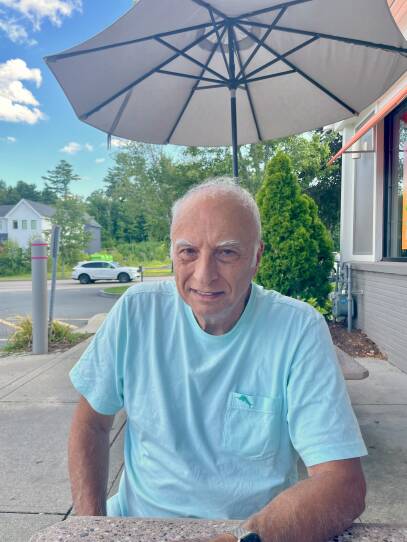About a year after the state transformed a former prison in Norfolk into an emergency shelter — a decision that caused major rifts between the town’s residents — the facility is now slated to close.
Families at the Norfolk shelter are working with case managers to find stable housing, according to the Massachusetts Executive Office of Housing and Livable Communities. If a family is unable to secure a unit by the time the shelter shuts down on Thursday, they will be transferred to another site within the emergency assistance shelter system.
But as local residents reflect on the last year, starting with the decision to repurpose the former prison into a place to house migrants, bitterness remains.
“They never had a plan, this was just ordered,” Jack Olivieri, founder of Concerned Citizens of Norfolk, said of the state government. “They didn’t care about the local community.”
The Norfolk shelter’s closure is part of an effort by Gov. Maura Healey’s administration to phase out the use of hotel shelters. In 2023, Massachusetts scrambled to meet a surge of demand when the state’s shelter population ballooned to nearly 7,500 families. While many in that surge were migrants, the state now says 90% of emergency assistance shelter applicants are Massachusetts residents.
But that demand has since dropped: today about 3,200 families are in shelters.. In May, Healey announced a plan to close the remaining 32 hotel shelters six months ahead of schedule due to the decreased caseload.
Last spring, Norfolk leaders and residents were surprised when Healey’s administration announced plans to send about 450 people to the small town, population about 11,000. The state, which owns the former Bay State Correctional Center, wanted to repurpose the property as part of its solution to meet the high demand for shelter amid a surge of migrants and residents in need.

“They told a lot of things about the shelter and who was going to be there and how it was going to be handled and everything. And they just kept telling us erroneous information” Olivieri said. “And so a lot of people in town here have a lot of trouble believing them, anything they say.”
On the day the first migrant families moved in, the bucolic town was turned on its head, polarizing residents into two camps: those wishing to welcome and support the migrants, and those who opposed the shelter. Opponents, including Olivieri, expressed concerns about public safety, school overcrowding and financial impact on the town.
He said in the end their fears were unfounded, but the shelter prompted lasting divisions in the town.
Olivieri said he was called racist and xenophobic for opposing the shelter.
“They attacked us, saying, ‘You don’t care about these people. They’re just trying to escape a vicious regime. They’re trying to make a better life for their families,’” he recalled. “And I’m saying, ‘They have an opportunity to go through a port of entry and get in line like everybody else and not jump the fence.’”
Lucy Bullock-Sieger, co-founder of Norfolk Strong, a group initially formed to help collect diapers, food and supplies for migrant children living at the shelter, called the shelter’s opening a “flash point” in Norfolk.
“Emotions were running high, but ultimately, I think that our best self shined,” she said. “And I know there are people who disagree with that, and that’s OK.”
Anita Mecklenburg, a member of the Norfolk Select Board, said relations in the town have evolved and improved.
“We are a welcoming community for all people,” she said. “The genuine outpouring of generosity and open-hearted giving was a real opportunity.”
Mecklenburg said the state announcing its plans over social media caused unnecessary fear due to lack of transparency. But she noted that communication between town leaders, the state and the agency overseeing the shelter improved drastically throughout the year.
Kevin Roche is a longtime Norfolk resident and owner of Norfolk Auto, which sits just across the street from the shelter. He had only been serving on the Select Board for three days before the announcement came that the state was opening the shelter.
“I tried to explain to everyone ‘Just don’t panic. Let’s wait, let it open and see what happens,’” Roche said.

Roche said he continues to discuss the migrant shelter with residents, but despite all the controversy, it hasn’t caused major problems.
“It wasn’t really much disruption to the town,” Roche said.
Bullock-Sieger said she was proud of the work her group has done, and specifically commended teachers for supporting migrant children who came into the town’s schools.
“The only bad thing that I had heard about from the schools was that it was really hard for some kids to say goodbye to their new friends. And I think that’s a win,” she said.
According to Roche and some local teachers, there were additional disruptions caused by migrant students attending the town’s two elementary schools and the high school in nearby Wrentham. They said educators had to constantly pivot to meet students’ needs while following state requirements. Specifically, they criticized the inconsistency and lack of information about students’ attendance.
“You have the children going in and sometimes only stayed there for 30 days,” Roche said. “So it wasn’t the same children at all times. And none of them really spoke English.”
One teacher told GBH News that the situation in the classroom was “chaos and things changed all the time” without much notice. However, the teacher added the students were appreciative and eager to learn.
Beyond direct impact on the town, Olivieri said he believes the state’s approach to shelter has been a failure.
“I blame the governor,” he said. “The governor was intent on making this — keeping this a sanctuary state, even though she says ‘It’s not a sanctuary state. That’s not the right term to use. We have a right-to-shelter law.’”
That 1980s era state law guarantees families and pregnant women access to shelter. But even as state leaders move away from housing people in shelters like the one in Norfolk, the state said that the system remains in crisis. Massachusetts Housing Secretary Edward Augustus issued a letter of declaration on the emergency assistance family shelter system that said even with $276 million budgeted through December, the state won’t be able to meet demand.
Produced with assistance from the Public Media Journalists Association Editor Corps funded by the Corporation for Public Broadcasting, a private corporation funded by the American people.





